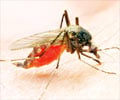Joining forces to combat malaria, ensuring equitable access to prevention, diagnosis, and treatment services worldwide.
- World Malaria Day 2024 calls for a renewed dedication to achieving health equity in malaria responses, emphasizing community engagement, innovation, and cross-border collaboration as essential pillars in the journey towards a malaria-free world
- Despite significant strides in reducing malaria cases and deaths, persistent challenges, such as political instability and drug resistance, threaten to impede further progress
- Urgent actions are needed to bridge the gap in access to malaria prevention, detection, and treatment services, especially for vulnerable populations
World Malaria Day 2024: ‘Accelerating the fight against malaria for a more equitable world’
Go to source).
World Malaria Day: History and Significance
The history of World Malaria Day traces back to 2007 when the World Health Assembly established it as an occasion to raise awareness and mobilize global efforts to combat malaria. Since then, it has served as a platform to galvanize action, advocate for increased investment, and celebrate the progress made in the fight against this deadly yet preventable disease.Malaria, caused by Plasmodium parasites transmitted through the bites of infected mosquitoes, has long been a scourge on humanity. It has inflicted untold suffering, claiming millions of lives and exacting a heavy toll on socio-economic development, particularly in the most vulnerable and marginalized communities.
Despite significant strides in recent decades, with notable achievements in reducing malaria incidence and mortality, progress has plateaued in recent years, posing a formidable challenge to public health efforts globally. This stagnation threatens to widen existing inequalities, as access to life-saving malaria interventions remains out of reach for many, perpetuating a vicious cycle of poverty and ill-health.
World Malaria Day: Addressing Inequities in Malaria Control
Infants, young children, and pregnant women bear the brunt of malaria's impact, facing heightened risks due to biological vulnerabilities and socio-economic factors. Additionally, refugees, migrants, indigenous populations, and those affected by humanitarian crises are disproportionately affected, often sidelined from disease control efforts and deprived of essential health services.In the South-East Asia Region, malaria remains a significant public health challenge, affecting the majority of countries and accounting for a substantial portion of the global burden outside Africa. However, amidst these challenges, there have been remarkable successes, exemplified by countries like Bhutan, Nepal, and Timor-Leste, which have made significant strides towards malaria elimination through sustained political commitment and community engagement.
World Malaria Day: Challenges and Opportunities
Despite progress, formidable challenges persist, particularly in countries grappling with political instability, social unrest, and health system weaknesses. The emergence of drug-resistant malaria strains, coupled with the dominance of Plasmodium vivax in certain regions, underscores the need for tailored approaches and innovative solutions to sustain momentum towards elimination.As we mark World Malaria Day 2024, it is imperative that we redouble our efforts to address the root causes of health inequities and ensure universal access to quality malaria prevention, diagnosis, and treatment services. This necessitates a multi-sectoral approach, encompassing not only health interventions but also broader social and economic determinants of health.
Harnessing the power of digital technology and fostering cross-border collaboration are essential strategies in our quest to achieve malaria elimination and advance health equity. By leveraging data-driven insights and community empowerment, we can tailor interventions to the unique needs of populations and accelerate progress towards a malaria-free world.
World Malaria Day 2024 serves as a clarion call to action, urging stakeholders to unite in solidarity and commitment to accelerate the fight against malaria. By addressing inequities, advancing gender equality, and upholding human rights, we can forge a more equitable world where no one is left behind in our pursuit of better health for all. Let us seize this opportunity to recommit ourselves to the ambitious goal of malaria elimination and build a future where every individual has the opportunity to thrive, free from the burden of this preventable disease.
- World Malaria Day 2024: ‘Accelerating the fight against malaria for a more equitable world’ - (https://www.who.int/southeastasia/news/detail/24-04-2024-world-malaria-day-2024-accelerating-the-fight-against-malaria-for-a-more-equitable-world#)
Source-Medindia












